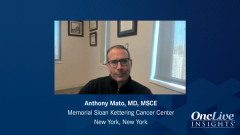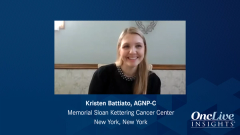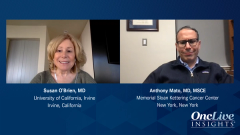
Targeted Therapies for CLL: Managing Adverse Events
Common toxicities associated with novel targeted therapies, such as BTK inhibitors, used to treat chronic lymphocytic leukemia, and recommendations on how to manage with dose adjustments.
Episodes in this series

Anthony Mato, MD, MSCE: Let’s just go into more details about the AE [adverse event] profile of these drugs. I’ll just mention the common toxicities for the different classes, the targeted therapy. For BTK [Bruton tyrosine kinase] inhibitors, bleeding, AFib [atrial fibrillation], aflutter, rash arthralgias. and myalgia infection are kind of the major ones that I think about. I would argue no BTK inhibitor is immune from these toxicities. It’s not like one choice or the other choice or choices in the future haven’t had BTK inhibitor associated events. I mean, it’s a class effect in my opinion. We’ll talk more in the future about head-to-head data, but that’s all from relapse/refractory setting. The frontline, when I counsel a patient who is on a BTK inhibitor, those are the risks regardless of the choice. Obinutuzumab [Gazyva], I think you covered already in detail, IRRs are the biggest risks, but also cytopenias can happen either acutely or delayed and you need to keep in mind that the platelets can drop the white count. Neutrophil count can drop. Venetoclax [Venclexta] to me is a little bit more straightforward in terms of AE risk. The biggest risks are cytopenias, hematologic toxicity, GI [gastrointestinal] toxicity, and then tumor lysis. And while cumbersome, the ramp-up that you just described, I think is almost full proof for preventing TLS [tumor lysis syndrome]. If you follow a label, it’s not going to happen. It’s just a lot of time commitment for patients, and then not included in the frontline setting yet, but we should just mention PI3K inhibitors are available in the relapse/refractory setting, maybe the frontline at some point. There you think of colitis pneumonitis, transaminitis infection, and opportunistic infections are being the major AEs associated with them. I think Kristen and I would both agree that the success particularly for continuous or long term oral therapies has to do with knowing the AE profile well, identifying them, having tricks to mitigate them, understanding the value of dose reductions, dose interruptions, class switching in some circumstances because these [aren’t] like chemotherapy where it’s 3 months or 6 months, and then you’re done. In order for a drug like ibrutinib [Imbruvica] or others to be successful, you have to actually keep patients on the drug long-term. Long-term can mean 5 years, 7 years, maybe longer, hopefully longer for many patients. Kristen, just a couple just in general, let’s not go into specific toxicities, but what are some of the strategies you use for managing a BTK inhibitor associated toxicity?
Kristen Battiato, AGNP-C: We try and get patients through these symptoms and we’ll often suggest supportive care. We can even recommend a brief hold and see if their symptoms improved or even, if we need to, we can even dose adjust if needed.
Anthony Mato, MD, MSCE: Then, just your general gut feeling, do the dose modifications or dose holds interruptions, are they helpful? What percentage of the time do you think it actually gets the patient through the adverse event?
Kristen Battiato, AGNP-C: I think 50% of the time actually helps and almost resets the symptoms for the patient and they’re actually able to tolerate restart drug at full dose and they usually do OK thereafter. It’s pretty rare that we have to dose reduce. We try to avoid that as well.
Transcript edited for clarity.





































